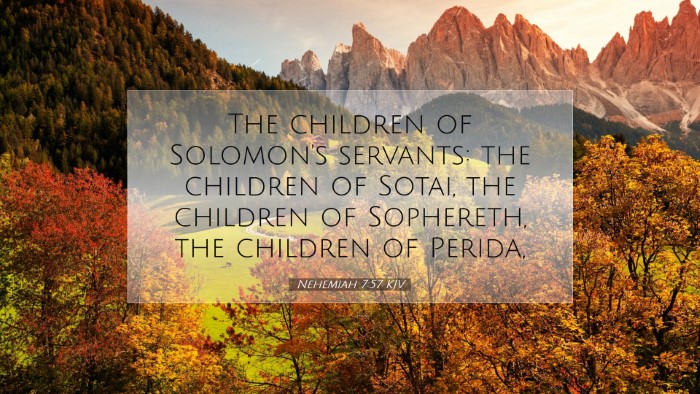Commentary on Nehemiah 7:57
Nehemiah 7:57 states: "The children of Solomon's servants: the children of Sotai, the children of Sophereth, the children of Peruda."
Introduction
This verse is part of a larger genealogical list that Nehemiah gathers to authenticate and record those returning to Jerusalem after the Babylonian exile. The inclusion of such names serves both a practical and a spiritual purpose, reflecting God's faithfulness in restoring His people to their land. In this commentary, we will pull insights from Matthew Henry, Albert Barnes, and Adam Clarke to explore the theological and historical significance of these individuals and their lineage.
Contextual Background
After the walls of Jerusalem were rebuilt, Nehemiah recognized the need for proper organization and accountability among the people. This chapter meticulously records the names and families of those who returned to Jerusalem, emphasizing the importance of heritage and identity within the covenant community.
Significance of Genealogies
Genealogies in the Bible often serve several key purposes:
- Establish Identity: The names listed help to re-establish the identity of a people who had been scattered. It roots them in their heritage.
- Fulfillment of Promises: God had promised to restore Israel; these lists confirm His covenant faithfulness.
- Encouragement for Future Generations: By chronicling their ancestors, it serves as a reminder of God's sovereignty and presence through history.
Insights from Matthew Henry
Henry emphasizes that even in seemingly mundane lists, God's work is evident. He notes that:
- Names, such as those of Solomon's servants, signify a connection to royal service, indicating a privileged status among the returning exiles.
- This connection enriches the cultural and spiritual fabric of the community being re-established in Jerusalem.
- Henry underscores the importance of obedience and service; each name represents a part of a larger narrative of faithfulness to God.
Insights from Albert Barnes
Barnes offers a historical perspective on these names. He notes that:
- The term "children of Solomon's servants" indicates that these individuals were descendants of those who served in the construction of the original temple.
- This lineage is significant because it shows that remnants of Solomon's era were continuing the legacy of worship and service.
- Barnes reflects on the spiritual implications of returning to Jerusalem as a contextual act of renewal, showcasing a community committed to rebuilding not only physically but also spiritually.
Insights from Adam Clarke
Clarke provides a detailed breakdown of the names mentioned, illustrating that:
- These names connect to various Hebraic roots, each possibly relating to vocational or familial roles within the historical context of Israel.
- He suggests that Solomon’s servants may symbolize a continuation of sacred duties established during the temple's construction.
- Clarke encourages contemporary readers to view these genealogies as reflections of divine grace in shaping the community of God through generations.
Theological Implications
The return of the children of Solomon's servants, as recorded in Nehemiah 7:57, serves as a theological reminder of:
- Restoration: The act of returning is both a historical event and a profound theological assertion of God’s ability to restore His people.
- Community: The emphasis on genealogy highlights that faith is communal and can be passed down through family lines.
- Service: The servants of Solomon remind us that service to God often continues across generations, calling the present community to consider their place in the ongoing mission of His people.
Conclusion
Nehemiah 7:57 serves as a testament to God's enduring covenant with His people. The names listed are not merely historical data but represent lives intertwined in the divine narrative of redemption. As we reflect on this verse, may it inspire pastors, students, theologians, and Bible scholars to discern the significance of our shared histories and collective identities in Christ.
In summary, this passage encourages us to cherish our roots and understand the continuity of God's plan through generations. Each name is a reminder of God's faithfulness and a call to live in accordance with our heritage as God's chosen people.


